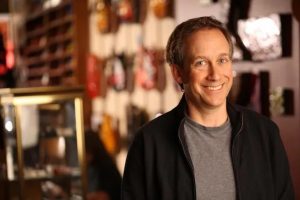Media: March 2022 • “Mark Caro’s Caropop”
Mark Caro was a well-known writer at the Chicago Tribune in 2015 when he decided to take a giant career leap.
“I was still really enjoying what I was doing,” he explains, “but It was important for me to leave when I was still happy as opposed to leaving when I was disgruntled and had bitter feelings about it. They had a major buyout offer, so I decided to take it. I was working on a book about songwriting. I had a novel that I wanted to finish. There was a lot of stuff I wanted to try. I had been writing for the Tribune for 26 years, and I thought if I didn’t use this opportunity as an impetus to try these other things, I might look back ten years from now and wish I had. I spent most of my time at the Tribune writing about people who took creative risks, and I felt like it was time for me to do the same.”
Those risks he took after his retirement from the Tribune have led him to the place he is today (host of the Caropop podcast), but it wasn’t exactly a straight line from one point to the other.
“I finished the song-writing book with Steve Dawson (Take it to the Bridge: Unlocking the Great Songs Inside You). I wrote a comedian’s memoir (Behind the Laughter, A Comedian’s Tale of Tragedy and Hope). I authored a book about the Mueller Report (The Special Counsel: The Mueller Report Retold). I was doing an ‘Is It Still Funny?’ movie series.”
But it was another project that led him to this point in his career.
“I launched a series of on-stage interviews at S.P.A.C.E. in Evanston. I did one with Len Kasper. John Langford. Nora Dunn from Saturday Night Live. And then the pandemic hit, so that ended on-stage interviews. But that’s when I realized I could do it in podcast form. I was never a huge podcast listener, but I saw the advantages right away. Not doing it person meant not worrying about how you looked. Not doing it in Chicago meant that I could talk to people all over the world. Not having a set time meant that I could do it at the interview subject’s convenience, whether it was eight in the morning, four in the afternoon, or nighttime. I didn’t need to worry about staging, securing a club date, or parking. So the podcast emerged out of these on-stage interviews, and I really like doing it this way.”
He created a website called Caropop.com.
“The idea was a combination website/podcast where I could write articles and blog posts and do podcasts in the same place without having to ask anyone’s permission for anything. The writing has fallen a bit into the background at this current time, but I have a great podcast producer (Chris Cwiak), and we’re getting great guests, and I’m really enjoying doing it. I even created the theme song myself. I should put it on iTunes and maybe get ninety-nine cents for it occasionally.”
Long-time fans of Mark’s work at the Tribune will not be surprised at the subject matter of his podcast.
“When I was with the Tribune, I wrote a lot about music, film, the arts, food. And those are the kind of guests I have on this podcast. Long-form interviews with creative people. I think the niche that I have is I’m interviewing these rock and soul people who are behind the scenes in a way, the band members (Bruce Thomas from Elvis Costello & the Attractions, Dave Gregory of XTC, Cathy Valentine from the Go-Gos) as opposed to the lead singers, or producers (Steve Albini Nirvana producer, Shel Talmy producer for the Kinks), or the guy who mastered the records (Bernie Grundman).”
Caro has an interviewing style that immediately puts his interview subjects at ease. He can speak to a musician in a language the musician innately understands, and those discussions often lead to revelatory moments. Instead of asking the tough questions directly, such as what caused a personality dispute within a band or what money-related arguments tore a band apart, he talks about the music they created. Inevitably, when the interview subject gets comfortable, the truth comes out.
“The way I do it now is the way I did for the stage as well,” Caro explains about his interview preparation. “I write up a whole slew of questions—pages and pages of them—and I read them and think about them, and then I put them to the side, and I really try not to look at them during the interview because I want it to be a conversation. If I’m just waiting to ask the next question, then maybe I’m not in the moment listening to the answer. I might miss something. Sometimes those unexpected answers can take the interview in a totally different direction and lead to a whole series of different questions that are better than questions I had pre-planned. The most important thing to do is listen. It makes you and the interviewee relaxed. You aren’t interrogating someone. You’re having a conversation.”
You can find those conversations on his website, Caropop.com. You can also check out his blog posts and articles, including his highly recommended breakdown of the Beatles’ Get Back special. For Beatles fans, it’s a must-read.
Follow Mark on Twitter @markcaro.
-Rick Kaempfer












